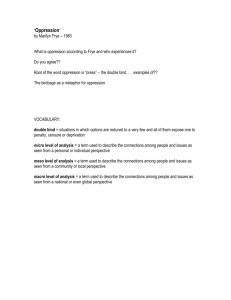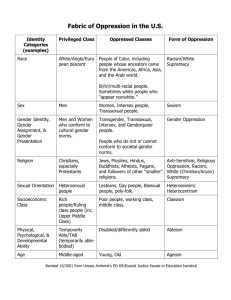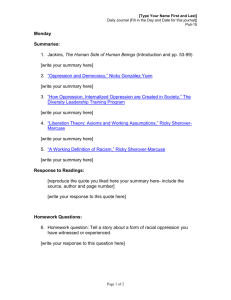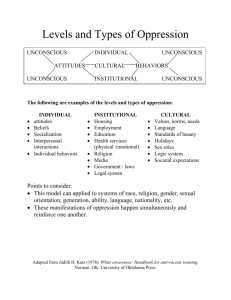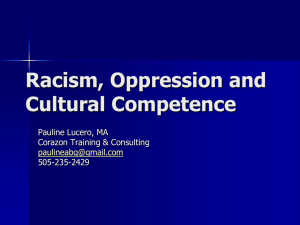DOC - Oppression and Justice
advertisement
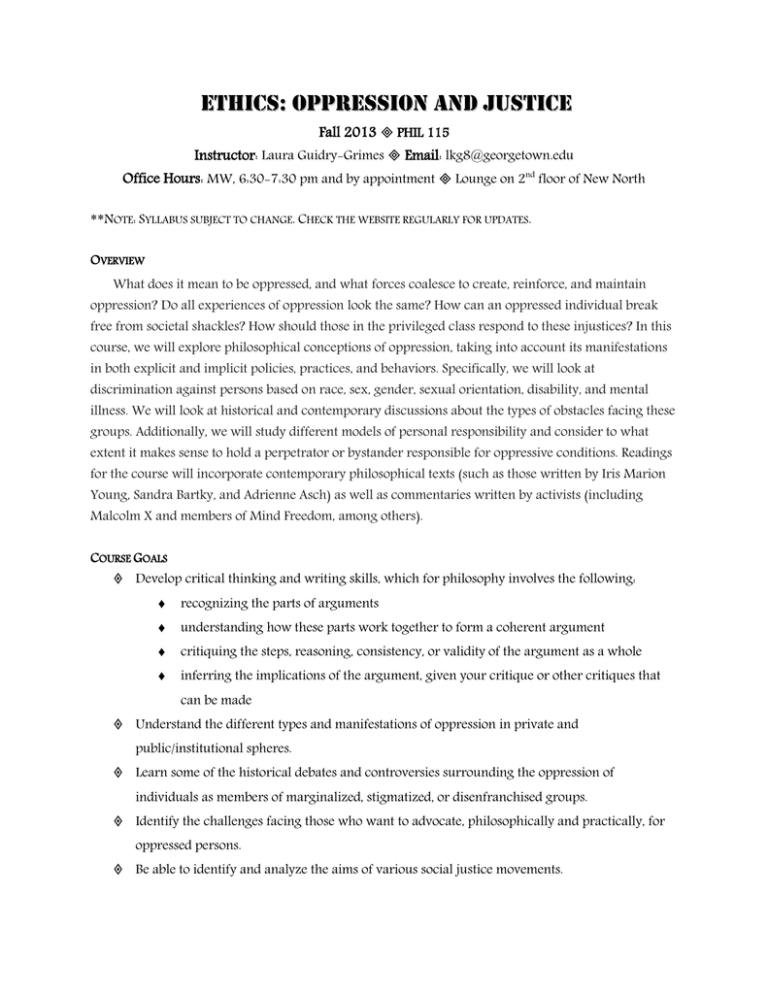
Ethics: Oppression and Justice Fall 2013 PHIL 115 Instructor: Laura Guidry-Grimes Email: lkg8@georgetown.edu Office Hours: MW, 6:30-7:30 pm and by appointment Lounge on 2nd floor of New North **NOTE: SYLLABUS SUBJECT TO CHANGE. CHECK THE WEBSITE REGULARLY FOR UPDATES. OVERVIEW What does it mean to be oppressed, and what forces coalesce to create, reinforce, and maintain oppression? Do all experiences of oppression look the same? How can an oppressed individual break free from societal shackles? How should those in the privileged class respond to these injustices? In this course, we will explore philosophical conceptions of oppression, taking into account its manifestations in both explicit and implicit policies, practices, and behaviors. Specifically, we will look at discrimination against persons based on race, sex, gender, sexual orientation, disability, and mental illness. We will look at historical and contemporary discussions about the types of obstacles facing these groups. Additionally, we will study different models of personal responsibility and consider to what extent it makes sense to hold a perpetrator or bystander responsible for oppressive conditions. Readings for the course will incorporate contemporary philosophical texts (such as those written by Iris Marion Young, Sandra Bartky, and Adrienne Asch) as well as commentaries written by activists (including Malcolm X and members of Mind Freedom, among others). COURSE GOALS Develop critical thinking and writing skills, which for philosophy involves the following: ♦ recognizing the parts of arguments ♦ understanding how these parts work together to form a coherent argument ♦ critiquing the steps, reasoning, consistency, or validity of the argument as a whole ♦ inferring the implications of the argument, given your critique or other critiques that can be made Understand the different types and manifestations of oppression in private and public/institutional spheres. Learn some of the historical debates and controversies surrounding the oppression of individuals as members of marginalized, stigmatized, or disenfranchised groups. Identify the challenges facing those who want to advocate, philosophically and practically, for oppressed persons. Be able to identify and analyze the aims of various social justice movements. Ethics: Oppression and Justice FALL 2013 ♦ PHIL 115 ♦ GUIDRY-GRIMES Evaluate competing conceptualizations of individual moral responsibility in relation to understanding and combating oppression. LOGISTICS PHIL 115 will be meeting Mondays and Wednesdays from 5:00-6:15 pm in Walsh, room 499. You can find class readings on Blackboard, but all other class materials and information will be on the course website: http://oppression-and-justice.weebly.com This course is part of the Engelhard program. ASSIGNMENTS Assignment Weight Deadline Participation 15% Reflection Paper 10% September 19th @ 11:59 PM Debate Contribution #1 10% October 6th @ 11:59 PM Short Paper #1 15% October 24th @ 11:59 PM November 1st @ 11:59 PM Idea for Final Project Debate Contribution #2 10% November 12th @ 11:59 PM Short Paper #2 15% December 3rd @ 11:59 PM Final Project 25% December 16th @ 11:59 PM DESCRIPTION OF ASSIGNMENTS Participation: You are expected to participate regularly and thoughtfully. You should demonstrate that you have read the required material, and you should also engage with your classmates. If there are not enough people participating on a given day, I will give out a pop quiz. In case you’ve been too quiet, you can improve your grade by contributing to the class blog on our website: http://oppression-and-justice.weebly.com/class-blog.html Blog posts cannot be fully substituted for in-class participation, however. Page 2 of 11 Ethics: Oppression and Justice FALL 2013 ♦ PHIL 115 ♦ GUIDRY-GRIMES Reflection paper: In the first couple of weeks of the semester, you need to take at least one of the tests (in Social Attitudes, Mental Health, or Featured Task) on the Project Implicit website (https://implicit.harvard.edu/implicit). Note: If you want to take a Mental Health one, you must take the Mental Illness IAT. After doing so, you need to write a short paper (500 words) on how the test and the test results have informed your notions on bias and personal responsibility. You are not required to tell me or show me the exact results of your tests. This paper is purposely open-ended. Debate contributions: On two days during the semester, we will have in-class debates on topics related to the course material. You will work with a group of students to present a case for your side of the issue. The night before each debate, you (each student) must submit 500 words on what you want to contribute to the debate. Some possible questions you can respond to as your contribution: What are the competing interests or obligations in this issue? How should the moral interests be weighed or understood? Based on your position, what is the most challenging aspect of resolving these ethical problems? What is a problem with one of the opposing views? Do not attempt to answer all of these questions in your paper. Focus on one particular aspect of the case that you will present with your team. Depth and thoughtfulness are more important than breadth. You should incorporate ideas, terms, or insights from course material. Check the course websites for more specific information on the instructions for the debate. Submit to Blackboard SafeAssign. Short writing assignments: You are required to write two short (750 words) papers based on the prompt that I provide. The prompt can be on any readings that we have done up to that point. The point of these papers is to help you build your philosophical writing skills. You must submit to Blackboard SafeAssign. Final project: You should find a topic relevant to the course that excites you. The topic should be manageable; in other words, “racism in the criminal system” is not a manageable topic because it is too vast. Narrow in on a smaller topic that you can lay out and discuss critically. Once you find an alluring issue, you will need to research some of the necessary facts related to the topic, and you will also need to reflect on the relevant arguments that scholars have published. Then you need to make your own contribution to the debate. This project is meant to serve as a launching pad in case you wish to pursue it in the future for advocacy or scholarship purposes. You are free to take up any well-argued and wellresearched position you find compelling. You need to email me by November 1st what your idea is for this project (failure to do so will affect your participation grade). Your project can be in one of four formats: 1) a traditional term paper, 2) a website, 3) a videotaped scripted debate on the topic (uploaded to YouTube, Vimeo, or something similar) or 4) an extended Power Point/Prezi/Keynote (which you would not present). If you have another idea for a project format, you need to have it approved by me. Regardless of which format you choose, your project should be 1800 words in length. You need to a) lay out the ethical issue, b) explain and analyze some published philosophical viewpoints on the topic, c) Page 3 of 11 Ethics: Oppression and Justice FALL 2013 ♦ PHIL 115 ♦ GUIDRY-GRIMES carefully and precisely argue how you believe the problem should be understood or resolved, d) identify and analyze an implication for personal responsibility for specific moral actors, and e) provide a compelling objection to your position. If you have the space, I will give extra points for including a nicely reasoned response to the objection. The final project is due on December 16th (our final exam day). Submit the paper, website content and link, video transcript and link, or Power Point/Prezi/Keynote PDF through Blackboard SafeAssign. CLASS MATERIALS REQUIRED: All readings will be available on Blackboard (http://campus.georgetown.edu). RECOMMENDED: Anthony Weston’s A Rulebook for Arguments COURSE POLICIES Attendance and tardiness: You are expected to attend class every day, and you should avoid tardiness. I will take roll daily. If you miss roll due to lateness, it is your responsibility to make sure that I have corrected the attendance sheet. If you need to miss class, you must e-mail me, preferably before the class meets. Keep in mind that sleeping in, fun local events, and work do not excuse you. You are only permitted two unexcused absences before points are deducted from your grade. You will lose one-third of a letter grade on your final grade for each unexcused absence after the first two (so ‘B+’ becomes a ‘B’ after one extra, ‘B+’ becomes a ‘B-’ after two extra). You must provide proper documentation for absences that you want excused. You only need to give me enough information for me to discern whether the excuse is legitimate and whether the documentation is adequate. Late assignments: You must turn assignments in on time unless you are given permission to do otherwise. I will deduct a full letter grade for each day an assignment is late without a documented, legitimate excuse (e.g., an ‘A’ paper becomes a ‘B’ for one day late; an ‘A’ paper becomes a ‘C’ for two days late). It is conceivable that you will have multiple deadlines and stressors in the same week as you have a deadline for this course, but this is not grounds for asking for an extension. In the case of piling deadlines, I recommend that you work out an earlier deadline for your assignment for this course. Except in extraordinary circumstances, I will not grant extensions when the assignment is due in less than 24 hours. Keep in mind that the deadline applies even if you have computer trouble. Page 4 of 11 Ethics: Oppression and Justice FALL 2013 ♦ PHIL 115 ♦ GUIDRY-GRIMES Paper length: You have 100-word leeway either way for papers. This means that your short papers must be between 650 and 850 words, or I’ll deduct points. How many points are deducted will depend on how much you go over or under the word limit. Same goes with the reflection paper and final project. Citations: All of your work must be cited correctly. You can use any official method, such as MLA, APA, or Chicago. Points will be deducted for omissions, serious errors, and repeated mistakes. Your final project should include a bibliography. Cell phone use: Your cell phones should be turned off when class begins. Laptops: You are permitted to use your computer in class, but only for class purposes. If you become a laptop zombie in class, I will email you with a polite warning. Repeated abuses of your laptop privilege will result in my prohibiting you to bring it to class anymore. Drafts and outlines: I will not look at drafts over e-mail or in office hours. However, you can bring in or send short outlines. I do not accept attachments, so you will need to copy and paste your text into the body of an email. Appealing grades: It is within your rights as a student to ensure that your grades fairly reflect the quality of your work. If you believe you deserve a higher grade on an assignment, you need to send me a list of concrete reasons for appealing your grade. I will then take 24 hours to review your work, and I will either keep your grade as is or raise it. After you have completed this step, you can appeal to my teaching mentor if desired. My mentor can give you a higher or a lower grade, depending on his judgment of your work. GEORGETOWN HONOR SYSTEM As signatories to the Georgetown University Honor Pledge, and indeed simply as good scholars and citizens, you are required to uphold academic honesty in all aspects of this course. You are expected to be familiar with the letter and spirit of the Standards of Conduct outlines in the Georgetown Honor System and on the Honor Council website. As faculty, I too am obligated to uphold the Honor System and will report all suspected cases of academic dishonesty. In this course, we will use Blackboard SafeAssign, which generates an originality report and indicates potential plagiarism cases. If I suspect plagiarism, I will alert you of my concerns and ask you for a meeting to discuss the case before I contact the Honor Council. Standards of Conduct: http://gervaseprograms.georgetown.edu/honor/system/53519.html Page 5 of 11 Ethics: Oppression and Justice FALL 2013 ♦ PHIL 115 ♦ GUIDRY-GRIMES ACADEMIC RESOURCE CENTER AND ADA ACCOMMODATIONS If you have a disability or believe you might and would like to receive accommodations in my course, then you should contact the Academic Resource Center (arc@georgetown.edu) to register as a student with a disability or for an evaluation referral. You should do this at the beginning of the term. The Academic Resource Center is the campus office responsible for reviewing documentation provided by students with disabilities and for determining reasonable accommodation in accordance with the Americans with Disabilities Act (ADA) and University policies. The Center is located on the third floor of the Leavey Center, Suite 335. You may access their website at http://ldss.georgetown.edu. WRITING CENTER Please consider taking advantage of the resources of the Writing Center. The Writing Center provides one-on-one peer tutoring focused on improving your writing skills. I encourage you to take your paper drafts to the Writing Center. Visit http://writingcenter.georgetown.edu for more information. You can also schedule an appointment with a Writing Center tutor online on the center’s website. DAILY BREAKDOWN OF READINGS & DEADLINES Please read the materials by the date listed. **Please note: A few of the course readings refer to terms that are considered offensive or inflammatory. I ask that you take an academic attitude toward these materials. If you find yourself becoming distressed at any point, please do not hesitate to contact me, and we will work out alternate readings for you. MODULE: OPPRESSION & PERSONAL RESPONSIBILITY WEEK ZERO August 28 Introduction to course WEEK ONE September 2 No class: Labor Day September 4 Page 6 of 11 Ethics: Oppression and Justice FALL 2013 ♦ PHIL 115 ♦ GUIDRY-GRIMES “Five Faces of Oppression” by Iris Marion Young Read the syllabus in its entirety. WEEK TWO September 9 “On Psychological Oppression” by Sandra Bartky “Discrimination” by Andrew Altman (section 2 only) September 11 “Resistance and Responsibility” by Ann E. Cudd (excerpt) WEEK THREE September 16 “Moral Responsibilities of Bystanders” by Thomas E. Hill, Jr. The Metaphysics of Morals by Immanuel Kant (excerpt) September 18 “If Everybody’s Responsible, Then Nobody Is” by Peg O’Connor Nicomachean Ethics by Aristotle (excerpt) Reflection paper due on Thursday, September 19th @ 11:59 pm. MODULE: RACE WEEK FOUR September 23 “White Privilege and Male Privilege” by Peggy McIntosh September 25 “The Sword That Heals” by Martin Luther King, Jr. “The Ballot or the Bullet” by Malcolm X Page 7 of 11 Ethics: Oppression and Justice FALL 2013 ♦ PHIL 115 ♦ GUIDRY-GRIMES WEEK FIVE September 30 “Overt and Institutional Racism” by Gertrude Ezorsky October 2 “Racial Cognition and the Ethics of Implicit Bias” by Daniel Kelly and Erica Roeddert Optional: “What Should White People Do?” by Linda Alcoff Debate contribution #1 due on Sunday, October 6th @ 11:59 pm WEEK SIX October 7 Debate materials (all need to be read in preparation for debate): “Fears about North Carolina’s Racial Justice Act Debated” by Craig Jarvis (http://www.newsobserver.com/2011/12/24/1731313/racial-act-fears-debated.html) “Bias Law Used to Move a Man Off Death Row” by Campbell Robertson (http://www.nytimes.com/2012/04/21/us/north-carolina-law-used-to-set-aside-adeath-sentence.html?pagewanted=1&_r=3) “‘Racial Justice Act’ Repealed in North Carolina” by Matt Smith (http://www.cnn.com/2013/06/20/justice/north-carolina-death-penalty) In-class debate on Racial Justice Act MODULE: SEX & GENDER October 9 The Subjection of Women by John Stuart Mill (excerpts) “Towards a Definition of Patriarchy” by Heidi Hartmann Optional: “Androcentrism” by Margaret Little WEEK SEVEN Page 8 of 11 Ethics: Oppression and Justice FALL 2013 ♦ PHIL 115 ♦ GUIDRY-GRIMES October 14 No class: Columbus Day October 16 The Politics of Reality by Marilyn Frye (excerpt) WEEK EIGHT October 21 “The Body and the Reproduction of Femininity” by Susan Bordo October 23 “Violence and the Remaking of a Self” by Susan Brison (http://search.ebscohost.com.proxy.library.georgetown.edu/login.aspx?direct=true&db=eft&AN= 507741604&site=ehost-live&scope=site) Short paper #1 due by Thursday, October 24th @ 11:59 pm WEEK NINE October 28 “Constructing Masculinity: Putting the How and the Why in the XY” by Shira Tarrant MODULE: SEXUAL ORIENTATION October 30 “Tracing the Rainbow: A Historical Sketch of the American Gay and Lesbian Movement” by Stephen M. Engel (excerpt) “Marriage and Domestic Partnership” by Elizabeth Brake (sections 4.3 and 5.2 only) Idea for final project due by Friday, November 1st @ 11:59 pm WEEK TEN Page 9 of 11 Ethics: Oppression and Justice FALL 2013 ♦ PHIL 115 ♦ GUIDRY-GRIMES November 4 Sexing the Body: Gender Politics and the Construction of Sexuality by Anne Fausto-Sterling (excerpts) November 6 “Gender Treachery: Homophobia, Masculinity, and Threatened Identities” by Patrick D. Hopkins WEEK ELEVEN November 11 “How Homophobia Hurts Everyone” by Warren J. Blumenfeld Debate contribution #2 due by Tuesday, November 12th @ 11:59 pm November 13 Debate materials (all need to be read in preparation for debate): “Protests, Boycott Calls as Anger Grows over Russia Anti-Gay Propaganda Laws” by Laura Smith-Spark (http://www.cnn.com/2013/08/01/world/europe/russia-gay-rights-controversy) “Russian’s Anti-Gay Crackdown” by Harvey Fierstein (http://www.nytimes.com/2013/07/22/opinion/russias-anti-gaycrackdown.html?_r=1&) “An Olympic Legend on Boycotts and Bigotry” by Frank Bruni (http://bruni.blogs.nytimes.com/2013/07/29/an-olympic-legend-on-boycotts-andbigotry/) In-class debate on Russian Olympics MODULE: DISABILITY & MENTAL ILLNESS WEEK TWELVE November 18 “The Dimensions of Disability Oppression: An Overview” by James Charlton Page 10 of 11 Ethics: Oppression and Justice FALL 2013 ♦ PHIL 115 ♦ GUIDRY-GRIMES November 20 “The Disability Rights Movement” by Willie V. Bryan “Disability beyond Stigma: Social Interaction, Discrimination, and Activism” by Michelle Fine and Adrienne Asch Optional: “Disability, Respect and Justice” by Linda Barclay WEEK THIRTEEN November 25 “Intellectual Disabilities—Quo Vadis?” by Trevor R. Parmenter November 27 No class: Tofurkey emergency WEEK FOURTEEN December 2 "A Mad Fight: Psychiatry and Disability Activism" by Bradley Lewis Short paper #2 due by Tuesday, December 3rd @ 11:59 pm December 4 “Recovering Our Sense of Value after Being Labeled Mentally Ill” by Patricia E. Deegan Read at least one article from each of the following links: MindFreedom: USA News (http://www.mindfreedom.org/news/usa-news) MindFreedom: Personal Stories (http://www.mindfreedom.org/personal-stories) FINALS WEEK December 16 No class meeting Final paper due @ 11:59 pm. Submit to Blackboard Safe Assign. Page 11 of 11
